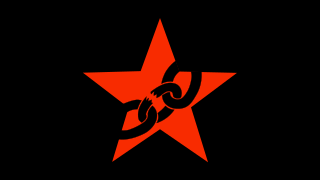
Bryansk is a city and the administrative center of Bryansk Oblast, Russia, situated on the River Desna, 379 kilometers (235 mi) southwest of Moscow. Population: 379,152 (2021 Census); 415,721 (2010 Census); 431,526 (2002 Census); 452,160 (1989 Census).

Dyatkovo is a town and the administrative center of Dyatkovsky District in Bryansk Oblast, Russia. Population: 25,255; (2021 Census)29,439 (2010 Census).
Soviet partisans were members of resistance movements that fought a guerrilla war against Axis forces during World War II in the Soviet Union, the previously Soviet-occupied territories of interwar Poland in 1941–45 and eastern Finland. The activity emerged after Nazi Germany's Operation Barbarossa was launched from mid-1941 on. It was coordinated and controlled by the Soviet government and modeled on that of the Red Army.

Kletnya is an urban-type settlement and the administrative centre of Kletnyansky District, in Bryansk Oblast, Russia. It is located on the Nadva River, 99 km west of the city of Bryansk. It is the final railway station on the branch line that connects Kletnya with Zhukovka, 43 km away, where it joins the main line between Bryansk and Smolensk. Population: 11,947 (2021 Census); 13,313 (2010 Census); 13,936 (2002 Census); 14,258 (1989 Census).
The Vereshchyovka train disaster occurred on January 24, 1944, near the village of Vereshchyovka in what was then the Oryol Oblast of the Soviet Union. Sources estimate that over 600 people died in the wreck. It is the deadliest train disaster in Russian history.
Rail sabotage is one of the Belarusian forms of grassroots action opposing the Russian invasion of Ukraine.
During the Russian invasion of Ukraine, Russia occupied vast portions of the territory of Ukraine, having already occupied parts of the Donetsk and Luhansk oblasts as well as the entire Autonomous Republic of Crimea since the beginning of the Russia-Ukraine war in 2014. Partisan groups began to be organized in mid-2022. These groups have been involved in intelligence-gathering, sabotage, and assassinations. Much of their activity has taken place in the Kherson and Zaporizhzhia regions.

The Combat Organization of Anarcho-Communists is a militant anarcho-communist organization in Eastern Europe, part of the Belarusian and Russian partisan movement. It aims for social revolution and a libertarian socialist society. Since the start of the 2022 Russian invasion of Ukraine, it has sabotaged railway infrastructure in Russia and Belarus, as well as attacking Russian military commissariats and telecommunications. According to The Insider, the group has become "the most active 'subversive' force" in Russia since the war began.

A series of Molotov cocktail arson attacks and shootings have taken place in Russian military commissariat registration and enlistment offices since the start of the country's invasion of Ukraine in 2022. Other governmental buildings have also been attacked in multiple regions of Russia. Part of the Russian partisan and anti-war movements, the attacks were spurred by several factors, including the outbreak of the invasion of Ukraine, the deployment of Russian conscripts to the front line, the start of spring conscription, and rumors about possible mobilization in the country, which were later found to be true. Commissariat offices recruit servicemen to the Russian Army and choose who is eligible and ineligible for service. The attacks are not a single coordinated campaign; behind them are a variety of people, from left-wing anarchists and scammers to far-right groups and assorted lone wolf actors.

Partisan movements emerged in Belarus and Russia following the Russian invasion of Ukraine. These resistance movements act against the governments of Alexander Lukashenko in Belarus and Vladimir Putin in Russia. Elements of the opposition also work to counter the interests of the armed forces of both countries, as well as against civilian supporters of these authorities, in order to put a stop to the war in Ukraine.

Stop the Wagons is a Russian anti-war movement that engaged in sabotaging Russian railways in various ways to prevent the transport of equipment, fuel, ammunition and other supplies to the war in Ukraine.

Community of Railway Workers of Belarus is a Belarusian opposition initiative of railway workers, recognized by the Belarusian authorities as an extremist formation.

Busly liaciać is a Belarusian opposition resistance group founded on 13 November 2020 and fighting against the Alexander Lukashenko government. Included together with the Cyber Partisans in the association "Supraciŭ"

The Russian Volunteer Corps is a paramilitary unit of Russian citizens, based in Ukraine. It was formed in August 2022, during the Russian invasion of Ukraine, to fight against the government of Vladimir Putin. The group reportedly consists of Russian emigrants who are primarily united by their opposition to Putin. According to Ukrainian military officials, the group is not a part of the Ukrainian armed forces. The group has been described as far-right. Its leader is a famous Neo-Nazi Denis Kapustin.

National Socialism / White Power Crew, is a Neo-Nazi extremist group operating in Russia, recognized by the Supreme Court of Russia as a terrorist organization.

Popular Resistance of Ukraine is a Ukrainian underground partisan organization operating in the territories of Ukraine occupied by Russian troops during the 2022 invasion of the country. The partisans operate in the rear and transmit the coordinates of important military facilities and the deployment of Russian troops to the Armed Forces of Ukraine.

Berdiansk Partisan Army is a Ukrainian underground partisan group operating in Berdiansk, Zaporizhzhia Oblast, Ukraine. It has been involved in attacks against the Russian occupation of Zaporizhzhia Oblast.

The Black Bridge is a Russian partisan movement opposed to the rule of Vladimir Putin. The organization supports the territorial integrity of Ukraine.
Bohuslavka is a village in Izium Raion (district) in Kharkiv Oblast of eastern Ukraine, at about 115.4 kilometres (71.7 mi) east-southeast (ESE) from the centre of Kharkiv city. It is the administrative centre of the Boguslavka village council, which also includes the villages of Zagrizove, Lozova and Nova Kruhliakivka. The village is on the left (eastern) bank of the Oskil Reservoir.

Martial law in Russia was introduced on 20 October 2022 during the ongoing Russian invasion of Ukraine and a month after the announcement of mobilization. President Vladimir Putin issued two decrees: “On the introduction of martial law in the territories of the DPR, LPR, Zaporozhye and Kherson Oblasts” and “On measures taken in the constituent entities of the Russian Federation in connection with Decree of the President of the Russian Federation dated October 19, 2022 No. 756”.















